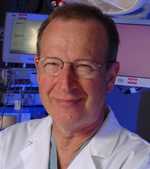November 2013

Joel D. Cooper, MD
Last year alone, 1,754 lung transplants were performed throughout the U.S., according to the Organ Procurement and Transplantation Network. Yet not long ago, lung transplantation was regarded as one of thoracic surgery’s great unsolved challenges. “It was thought that the bronchus might just be the Achilles’ heel of transplantation, and it just was an insoluble problem,” says Joel D. Cooper, MD, 74, from his office at the Perelman School of Medicine at the University of Pennsylvania.
After participating in the 44th failed attempt in the late 1970s, Dr. Cooper retreated to his lab at University of Toronto. With the support of his colleagues and a number of research fellows from around the world, they conducted a series of wound-healing experiments in dogs that uncovered the culprit: high doses of the immunosuppressant drug prednisone interfered with the healing process. Using omentum and cyclosporin (both experimental at the time), Dr. Cooper and his team completed the first successful lung transplant in 1983 on a 58-year-old Canadian hardware executive and pulmonary fibrosis patient Tom Hall, and the procedure was reproducible.
“When everybody failed, Joel never gave up on making the dream of lung transplantation a reality,” says Shaf Keshavjee, MD, surgeon in chief at (Toronto) University Heath Network and director of the Toronto Lung Transplant Program, which Dr. Cooper initiated. “Thousands of lung patients are alive because of Joel’s contributions.”
November marks the 30th anniversary of the first successful single-lung transplant, but it’s hardly Dr. Cooper’s only contribution to thoracic surgery and medicine. Dr. Cooper, a professor of surgery at Penn and an ATS member since 1976, directed the first successful double-lung transplants in 1986 and 1987, and later the bilateral, sequential, single-lung transplantation procedure to treat cystic fibrosis, emphysema and pulmonary hypertension. He also co-developed the lung preservation solution low potassium dextran solution with glucose (LPDG), which researchers in Scandinavia further developed and later commercialized as Perfadex.
“Thoracic surgery is a wonderful specialty,” Dr. Cooper says. “It may not be as flashy as cardiac surgery. But I tell my students, if you want to be a surgeon and a doctor, then be a thoracic surgeon. This is because you are the diagnostician. You take care of your patients post-op, and you see them for years, if not for life. It’s also an old specialty, but there’s a lot of new things that have occurred that make it still very exciting.”
Having graduated summa cum laude in 1964 from Harvard Medical School, Dr. Cooper completed his surgical internship, residency, and fellowship at Massachusetts General Hospital, where he was heavily influenced by the late Hermes Grillo, MD, an early luminary in thoracic surgery. Under Dr. Grillo’s tutelage, Dr. Cooper developed the low-pressure tracheal tube cuff, which is now used in every ventilated patient to prevent scarring. “Hermes Grillo was a very key part and a wonderful technical surgeon, and a very intelligent, thoughtful, wonderful role model,” says Dr. Cooper, who’s published more than 400 articles.
At the invitation of Dr. Pearson, Dr. Cooper joined the University of Toronto faculty in 1972, and by 1978 was head of the Division of Thoracic Surgery at Toronto General Hospital. After his success in Toronto, Dr. Cooper led the Washington University in St. Louis’s Section of General Thoracic Surgery and later became chief of the Division of Cardiothoracic Surgery. His former mentee Larry R. Kaiser, MD, who is now president of the Temple University Health System, asked him to join Penn in 2005 as chief of the Division of Thoracic Surgery, a position in which he served until 2011. As professor of surgery, he continues to teach, practice, and research. Free of administrative duties, he also finds more time to tend to his garden with his wife, a passion he developed in his family’s World War II victory garden when he was three years old.
When asked how he felt about his legacy of solving a great thoracic mystery, Dr. Cooper humbly answers, “We put the icing on the cake that other people had spent years and years baking. I think it was Isaac Newton coined the aphorism, ‘if we see further, it’s because we stand on the shoulders of giants.’ Nothing, I think, typifies that more than the transplant.”

